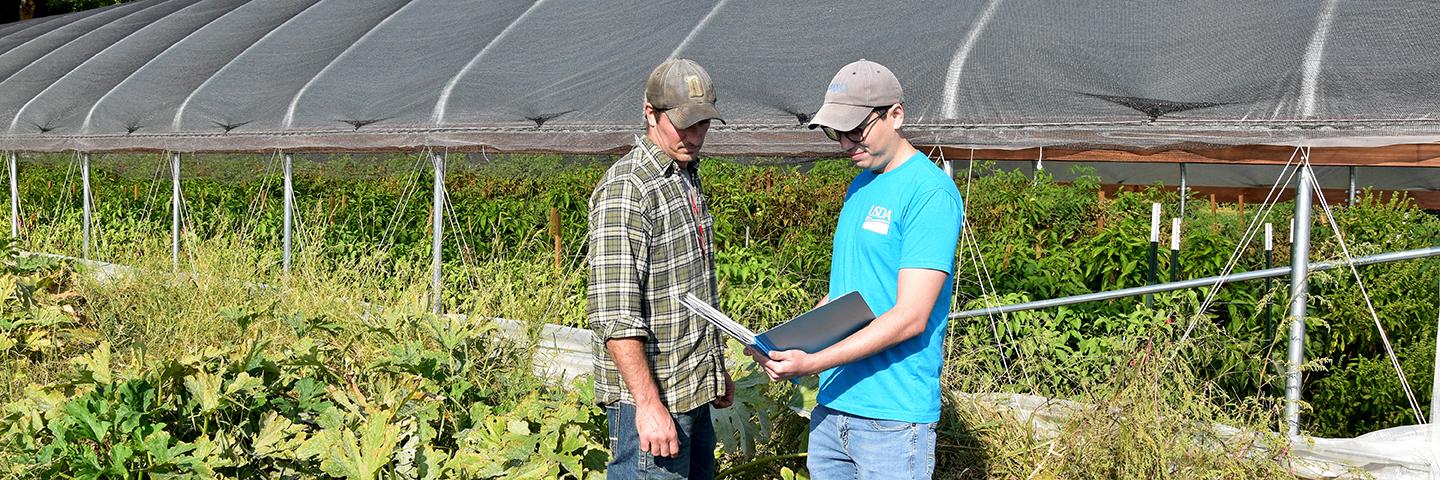High Tunnels Help Junge Grow Produce Business

Adam Junge’s budding produce business near Underwood in southwest Iowa is about to grow even more with help from the U.S. Dept. of Agriculture’s Natural Resources Conservation Service (NRCS).
Junge is installing a high tunnel this fall with assistance through USDA’s High Tunnel System Initiative to help improve his overall operation.
High tunnels are enclosed polyethylene, polycarbonate, plastic, or fabric covered structures used to protect crops from sun, wind, excessive rainfall, or cold. High tunnels are different from greenhouses because they have no permanent flooring, with the option of growing plants directly into the soil. They are also movable and have a simple structure compared to greenhouses.
High tunnels are a popular practice for fruit and vegetable growers because they:
- Extend the growing season
- Improve plant and soil quality
- Reduce nutrient and pesticide transportation
- Improve air quality through reduced transportation inputs
- Reduce energy use by providing customers with a local source of fresh produce
Junge has been in the produce business for nearly his entire life. He grew up in Omaha, where his family produced and sold vegetables as far back as the 1890s. He helped and learned from his father, Herman, at his west Omaha operation for years and more recently grew produce on a friend’s property near Fort Calhoun, Neb.
Underwood Location
In July 2019, he found his current location between Underwood and Council Bluffs, where he and his wife, Erin, and two children now call home. At the start of the 2020 growing season, Adam began growing and selling fruits and vegetables in Iowa under the name, Junge Fresh Produce.
Following his second growing season in 2021, he was hit with adversity. “I relocated a high tunnel here from our last location in Fort Calhoun, but it was destroyed in a December 2021 EF2 tornado that went down our road,” said Junge.
He replaced his downed high tunnel on his own for the 2022 growing season, but now with the growing season nearly complete Junge is looking to improve and expand his operation. He did some online research and found that NRCS offers financial assistance for high tunnels. “I talked to (Soil Conservationist) Rafael (Gonzalez-Pagan) at the NRCS office in Council Bluffs and he helped me with my application,” he said.
Junge is constructing his new high tunnel with the help of Erin and Herman. They expect to have it completed this fall, including the irrigation lines and other amenities for the 2023 growing season.
NRCS Program Application Process
Junge ranked well in the High Tunnel application process because he farms in proximity to an urban area. “We hope high tunnels allow for more affordable and available local produce,” said Gonzalez-Pagan. “Adam also received a higher payment rate for his high tunnel since he is a beginning farmer.”
Junge says he can plant tomatoes in a high tunnel about a month before he can safely outside. “As long as I can keep produce ventilated when it’s really cold outside, the crops will continue to produce into late fall, as well,” he said.
In 2022, Iowa NRCS paid producers about $7,000 to $8,400 of the cost for a traditional Gothic (rounded top) high tunnel and about $8,230 to $9,870 for a Quonset style (curved peak) high tunnel.
Adam credits his father for helping him venture out on his own, as well as working with USDA to get assistance for high tunnels. “My dad’s the one who told me to contact the USDA for assistance,” he said. “He loves what we’re doing and takes time to come over here to help us out with planting, weeding, harvesting, and washing.”
Produce Variety
Adam considers his Junge Farm Produce business a “hobby or business venture” but says if business continues to grow, he plans to go full-time.
Junge grows a wide variety of produce. He says tomatoes and seedless watermelons are his biggest sellers, but he also grows peppers, asparagus, cucumbers, sweetcorn, cantaloupe, strawberries, blueberries, rhubarb, broccoli, lettuce, beets, and more.
During the growing months, he sells produce at farmers markets in Underwood, Treynor, and the Florence Mills Farmers Market in Omaha. He also sells directly from home on Tuesdays, Thursdays, and Saturdays.
Junge runs a drip irrigation system to his high tunnel and had spickets installed for more high tunnels. He says high tunnels not only extend the growing season, but also make for a controlled environment year-round to grow better quality produce. “My goal is to have a good quality product,” he said. “People won’t come back if it’s not good.”
High Tunnel System Initiative
The High Tunnel System Initiative is a voluntary program administered through USDA-NRCS that provides financial and technical assistance to agricultural producers. Producers interested in the High Tunnel Initiative may apply at any time by contacting their local USDA Service Center.

